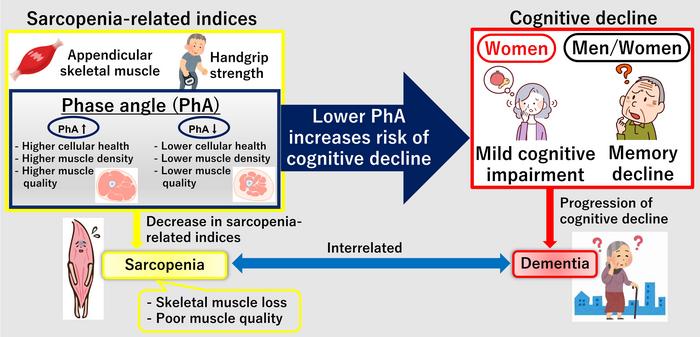A quick, painless measurement of muscle quality could help doctors identify people at risk of memory loss years before symptoms appear, according to new research from Doshisha University in Japan.
The study of 263 middle-aged and older adults found that phase angle—a bioelectrical measurement that reflects cellular health and muscle integrity—was strongly linked to cognitive performance, particularly memory function. Unlike traditional muscle assessments that require grip strength tests or complex physical evaluations, phase angle can be measured in seconds using a simple device similar to a bathroom scale, making it an ideal screening tool for routine health checkups.
The Muscle-Brain Connection Revealed
The research team, led by Dr. Kentaro Ikeue, examined five different measures of muscle health to determine which best predicted cognitive decline. These included muscle mass, grip strength, and the novel phase angle measurement.
“We found that a higher phase angle is associated with a lower risk of mild cognitive impairment in women,” explained Dr. Ikeue. The results showed that women with higher phase angle scores had a 72% lower risk of developing mild cognitive impairment—a precursor to dementia.
What makes phase angle particularly intriguing is what it actually measures. Unlike muscle mass or strength, phase angle reflects the quality of muscle tissue at the cellular level, including cell membrane integrity and the balance of fluid inside and outside cells.
Memory: The Early Warning System
Perhaps most significantly, the study revealed that phase angle correlated with memory performance in both men and women—crucial because memory decline often represents the earliest detectable sign of cognitive problems.
“Additionally, a higher phase angle was linked to better memory in both men and women, which is particularly noteworthy since memory decline is often the earliest manifestation of cognitive impairment,” Dr. Ikeue noted.
This finding addresses a critical challenge in dementia prevention: identifying at-risk individuals before obvious symptoms emerge. Current cognitive tests often detect problems only after significant brain changes have already occurred.
Key Study Findings:
- Phase angle reduced mild cognitive impairment risk by 72% in women
- Memory performance correlated with phase angle in both sexes
- Women showed broader cognitive benefits across multiple brain functions
- Traditional muscle measures (mass, grip strength) showed weaker associations
- Effects remained significant even after accounting for age differences
The Gender Divide in Brain-Muscle Health
One of the study’s most intriguing discoveries was the stark difference between men and women in how muscle quality relates to brain function. While phase angle primarily correlated with memory in men, women showed much broader cognitive benefits.
In women, higher phase angle scores were associated with better performance across multiple cognitive domains: memory, language, executive function, and attention. This suggests that the muscle-brain connection may be more extensive in women, possibly related to hormonal differences or other sex-specific factors.
The research revealed that the relationship between muscle quality and cognitive function appears fundamentally different between sexes. The study found that “muscle quality plays a more significant role in cognitive function than other muscle properties/functions in women,” while in men, different muscle measures might compensate for each other.
The Science Behind the Numbers
Phase angle is measured using bioelectrical impedance analysis—the same technology found in many home body composition scales. The technique sends a small, imperceptible electrical current through the body and measures how tissues respond.
Healthy, well-functioning cells with intact membranes create a characteristic electrical signature. As cells deteriorate—whether from aging, disease, or poor nutrition—this signature changes, reflected in a lower phase angle measurement.
The study’s participants ranged from 40 to over 80 years old, with a median age around 60. Researchers found that 31% had mild cognitive impairment, demonstrating how common early cognitive changes are in this age group.
From Research to Real-World Application
The practical implications extend far beyond academic interest. Unlike complex neurological testing or expensive brain imaging, phase angle measurement is “quick and convenient” and could easily be incorporated into routine medical exams.
“Our findings suggest that phase angle is not only useful for assessing sarcopenia but also serves as a potential marker for early cognitive decline,” noted Dr. Ikeue.
The technology is already widely available. Many hospitals and clinics have bioelectrical impedance devices, and the measurement takes less than a minute to complete.
The Myokine Connection
The study reveals a fascinating biological mechanism: the role of myokines—chemical messengers released by muscle tissue that can affect brain function.
The research suggests that phase angle might reflect the muscle’s ability to produce irisin, a specific myokine involved in memory and learning. Interestingly, previous studies found that irisin levels show “a significant relationship, in female but not in male patients with [Alzheimer’s disease],” matching the sex differences observed in the current study.
This connection could explain why muscle quality predicts cognitive function better than muscle mass or strength alone. It’s not just about having big muscles—it’s about having healthy, metabolically active muscle tissue capable of supporting brain health.
Looking Forward
The researchers acknowledge important limitations: this was a snapshot study of Japanese adults, not a long-term follow-up that could prove cause and effect. Future research needs to determine whether improving muscle quality actually prevents cognitive decline.
However, the implications are already clear for prevention strategies. “Adopting personal behaviors aimed at improving muscle quality may serve as a preventative measure against dementia, especially in women,” added Dr. Ikeue.
The study represents a potential paradigm shift in how we think about brain health. Rather than waiting for memory complaints or cognitive symptoms, a simple muscle measurement might help identify at-risk individuals decades earlier—when interventions are most likely to be effective.
If our reporting has informed or inspired you, please consider making a donation. Every contribution, no matter the size, empowers us to continue delivering accurate, engaging, and trustworthy science and medical news. Independent journalism requires time, effort, and resources—your support ensures we can keep uncovering the stories that matter most to you.
Join us in making knowledge accessible and impactful. Thank you for standing with us!

